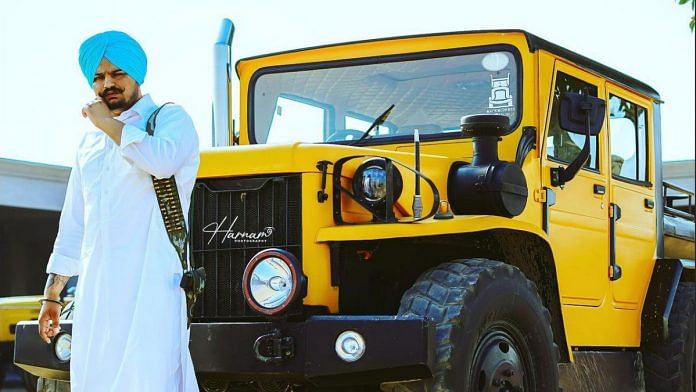Sidhu Moose Wala’s meteoric rise from an engineering graduate to a world-renowned performer was abruptly cut short on 29 May 2022, when he was gunned down by at least six shooters. The 28-year-old, who was on his way to his aunt’s house in Jawahar Ke village in Punjab’s Mansa, sustained 19 bullet wounds.
Hours later, Canada-based gangster Goldy Brar claimed credit for the killing. Investigators said that they suspected Brar’s involvement at the behest of jailed gangster Lawrence Bishnoi, who wanted to avenge the August 2021 killing of Youth Akali Dal leader Vicky Middukhera.
The high-profile killing brought the focus back on the ties between organised crime, the Punjabi music industry and the gun culture that both thrive on.
Climb to the top
Sidhu Moose Wala was born Shubhdeep Singh in Moosa village in Punjab’s Mansa district on 11 June 1993. He graduated in electrical engineering from Ludhiana’s Guru Nanak Dev Engineering College in 2016 before enrolling at Brampton College in Ontario, Canada.
Shubhdeep released his debut track G Wagon in 2017, while he was in Canada on a student visa. His career, however, really took off in 2018, when So High started to blare out of SUVs cruising across Punjab and beyond.
Shubhdeep, now Sidhu, had become a voice for the law of the street — the latest in a long line of ‘gangsta rap’ artists to do so.
Moose Wala considered American rapper Tupac Shakur one of his icons. In 2019, he released a single called Homicide with the words: “Sidhu Moose Wala sunn Naam Jatt da, Tupac naal mildi e rashi mitheya”. The verse roughly translates to Sidhu Moose Wala is the man’s name, his stars align with that of Tupac.
Moose Wala’s life, or rather his death, bore an eerie resemblance to that of his icon. Tupac was killed in a drive-by shooting near the Las Vegas strip on 13 September 1996, at age 25, just about five years into his recording career. Barely a fortnight before he was to meet the same fate as Tupac, Moose Wala, a little less than five years into his career, released the track Last Ride. Its album art featured the BMW Tupac was killed in.
Moose Wala’s verses, much like his idol’s, were sharp as a knife, cutting up preconceived notions about a quiet life in the backwaters of agrarian distress.
His compositions were a reflection of life in Punjab, where thousands of young men and women are living under the shadow of abject poverty and rampant drug abuse. Like most Punjabi hip-hop tracks, Moose Wala’s too had the garnishing of unabashed mentions of semi-automatic weapons and Land Rovers.
This intermingling of fame and violence was a progeny of the gang culture that took hold in Punjab during the 1980s with the rise of student politics. Gang members’ brazen acts of violence were mistaken for gallantry and their advertised philanthropy for kindness. ‘Gang culture’ became aspirational and cool. And Moose Wala’s brand of gangsta rap cemented that notion.
In May 2020, Moose Wala was booked under the Arms Act after a video of him shooting an AK-47 at a firing range surfaced on social media. In July, Punjab police filed another case against him for promoting violence and gun culture with his song Sanju, in which he compared himself to actor Sanjay Dutt.
When asked whether he was lionising gun culture, Moose Wala said that “guns are not a bad thing” and one should “know how to use them”.
“If guns were so bad, why does the government issue a licence for it,” he asked.
Also Read: Pakistani singer Zeeshan Ali has more Indian fans. They call him new Ali Sethi
A life cut short
Throughout his recording career, Moose Wala released four albums and composed (or featured in) more than 100 tracks.
His songs 295, Levels, Never Fold, Same Beef, Outlaw and East Side Flow made it to the charts not just in India and Pakistan, but also in Canada, New Zealand and Fiji. The track 295 even made it to the Billboard Global 20 for a brief period last year.
But he could not replicate his success in acting or politics. Between 2019 and 2021, he acted in three movies — Teri Meri Jodi, Moosa Jatt, and Yes I am Student.
His movies, while they were not outright flops, did not do exceptionally well in the box office. “The story impresses the audience but not the acting of Sidhu Moose Wala,” read one review of the 2021 movie Yes I am Student.
His tryst with politics met a similar fate. Moose Wala was inducted into the Congress in December 2021 by the party’s then-Punjab chief Navjot Singh Sidhu, months before the assembly election. Sidhu hailed him as a ‘youth icon’ whose songs were enjoyed by “youngsters and elders” alike.
Moose Wala was fielded from the Mansa assembly seat. Like the Congress’s own fortunes in Punjab, he too lost the election to Aam Aadmi Party (AAP) candidate Vijay Singla by a margin of 63,323 votes.
When asked about his ideology, Moose Wala said that he believed in “live and let live” and that his religion was roti and insaniyat (humanity). In the same interview, he expressed admiration for Saddam Hussain and how he took control of Iraq in a time of turmoil.
A year since he was killed in cold blood, the investigation into his murder is still ongoing. Though some arrests have been made, Moose Wala’s mother says the family is still awaiting justice.
Moose Wala’s stardom has only risen posthumously, with him attaining the status of a ‘cultural icon’ in Punjab.
Perhaps, the best way to sum up his legacy is in the words of Moose Wala’s idol Tupac — “I know what good morals are, but you’re supposed to disregard good morals when you’re living in a crazy, bad world.”
(Edited by Theres Sudeep)



